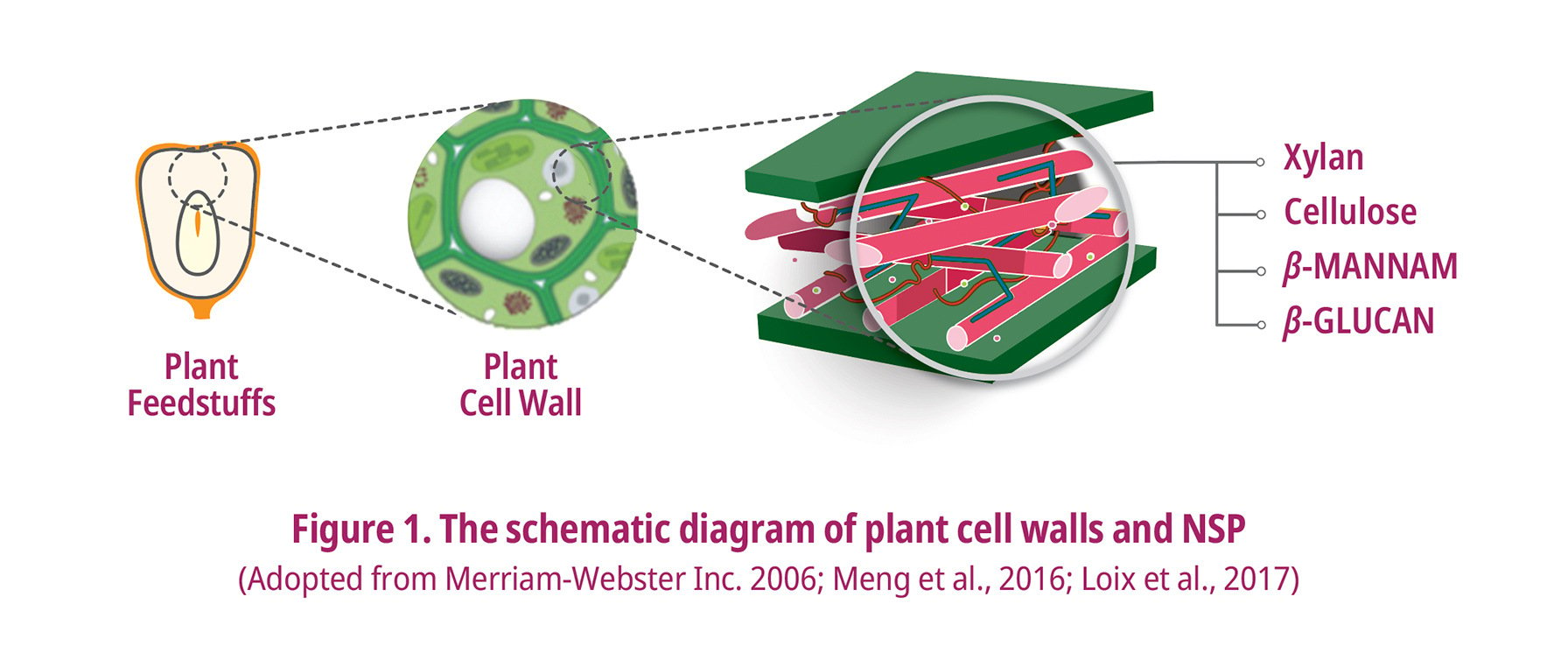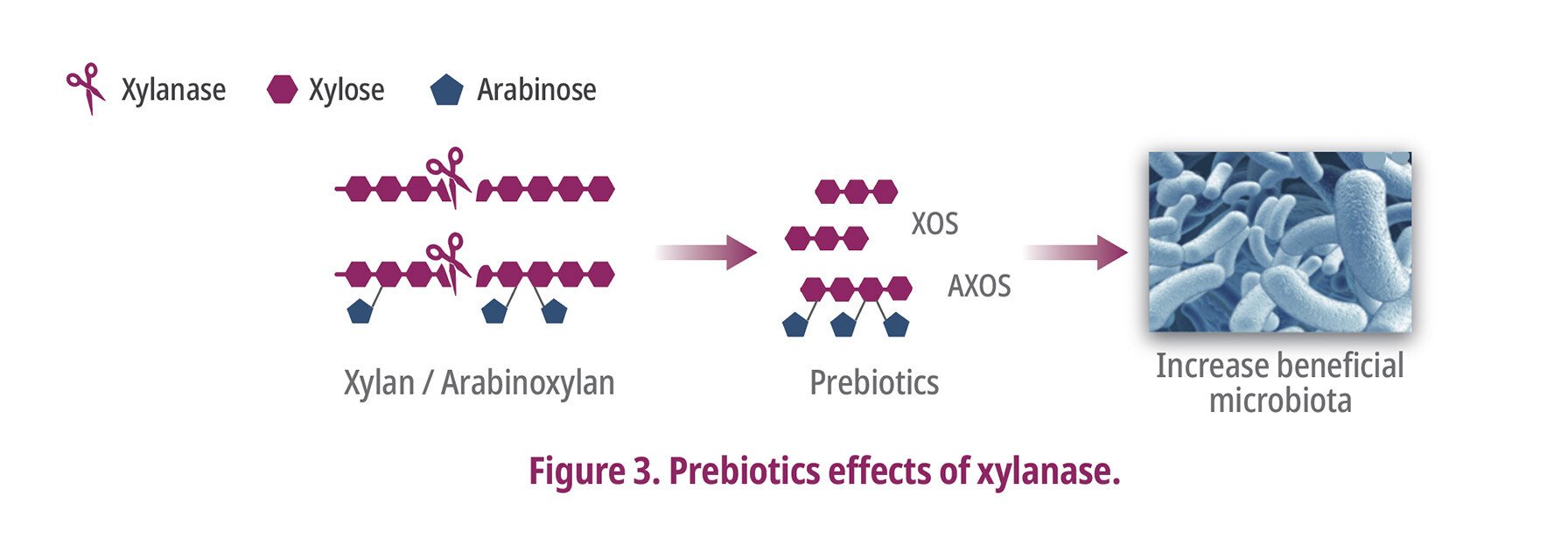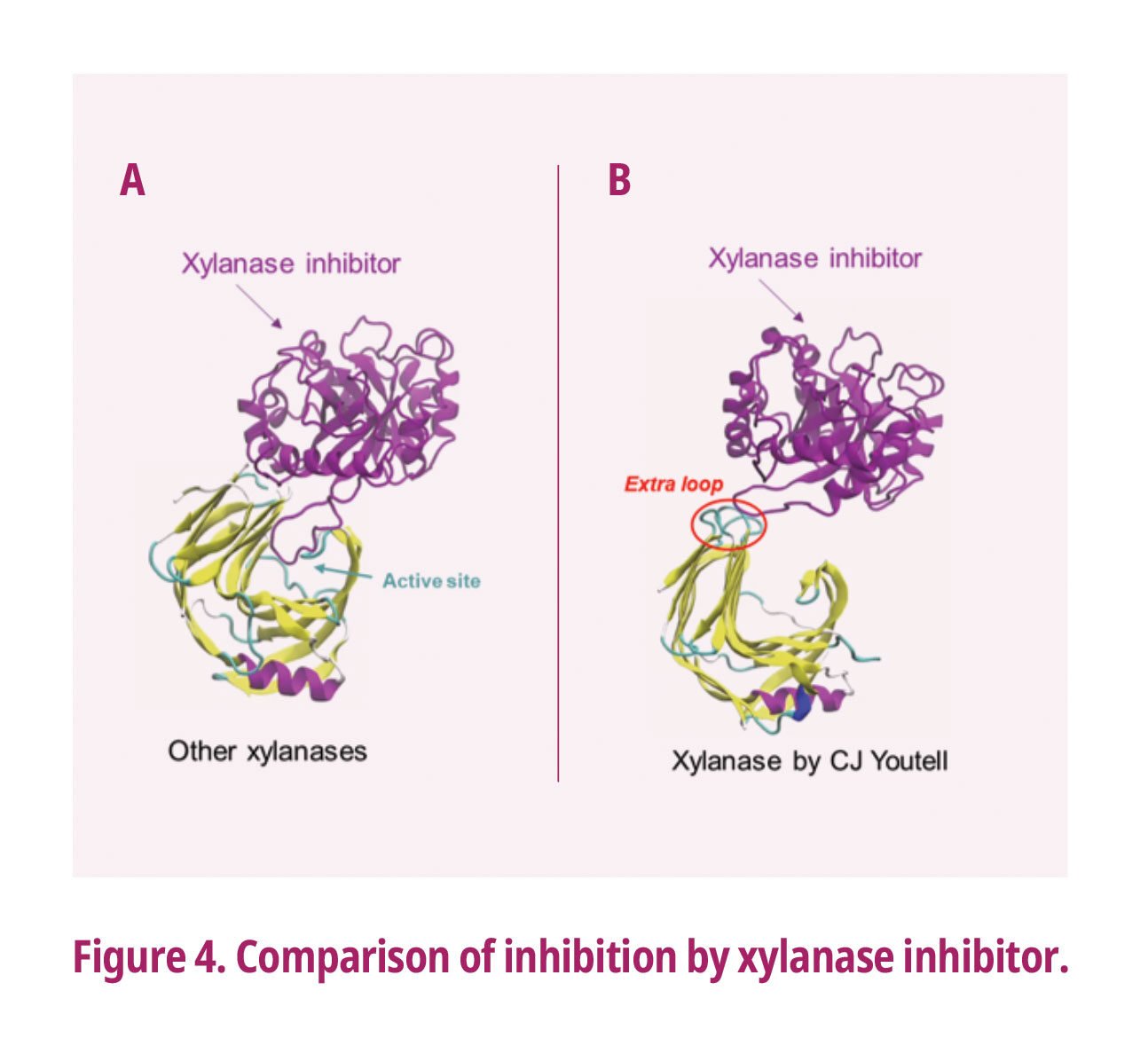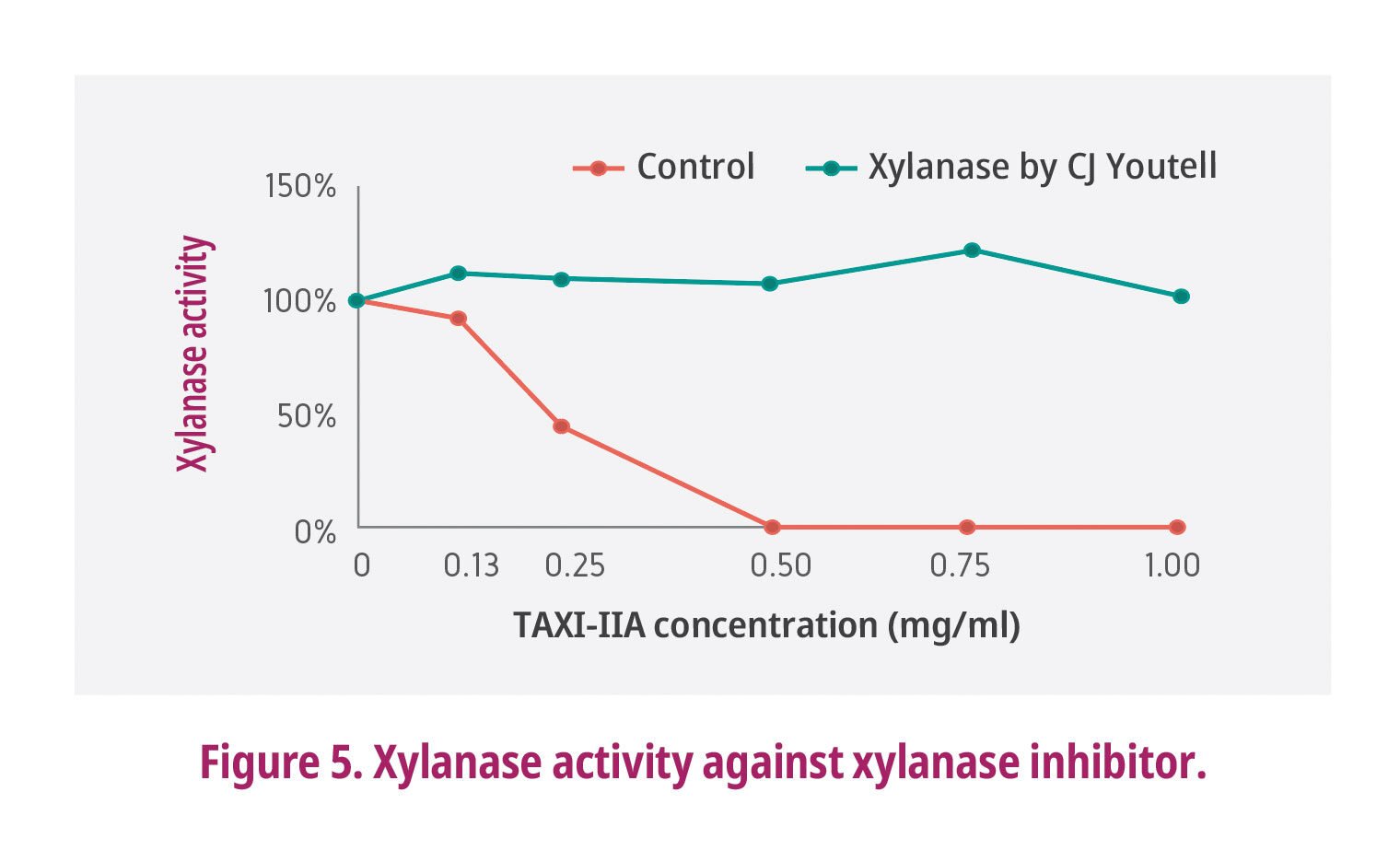Xylanase: special xylanase by CJ Youtell
2020.09.25

INTRODUCTION
Background
Pig and poultry feeds are based primarily on cereal grains such as corn/maize, wheat, sorghum and vegetable protein meals which are required to meet most of the energy and protein requirements. In addition, these grains have also been used in bio-fuel production for many years. Diverting these conventional feedstuffs to ethanol production results in an increase in the price of the raw ingredients internationally. Therefore, it has become important to find ways to use cheaper alternative feedstuffs such as DDGS, corn gluten feed, palm kernel meal, sunflower meal and bran in order to deal with increasing feed costs and to develop sustainable animal production. However, such substitutions contain high amounts of anti-nutritional factors (ANF) which could negatively affect growth performance, feed efficiency, and gut health in poultry and pig. Due to the ANF including non-starch polysaccharides (NSP), the use of these alternative feedstuffs as feed materials is limited. (Raza et al., 2019; Teymouri et al., 2018; Al-Harthi, 2017; Waititu et al., 2018).
Understanding of seed grains and NSP
A whole grain kernel or seed is composed of three parts: bran, endosperm, and germ. The bran is the outer shell that protects the seed and has thick cell walls. The endosperm contains a lot of energy sources and the germ plays an important role in providing nourishment to the seed, also the cell walls of both tissues are relatively thin.
The cell walls are the protective and semi-permeable outer layer of a plant cell and are composed of cellulose, hemicellulose (xylan, arabinoxylan, β-glucan, β-mannan, etc.) and pectins (Fig. 1). The composition of NSP may vary depending on the type of plant tissues and grains.

Negative effects of arabinoxylan
Arabinoxylan is a polysaccharide composed of β-1,4-linked xylose units with side branches of arabinose. Among the many types of hetero-xylans, arabinoxylan is most abundant in major plant feedstuffs. Its composition accounts for 8-30% (DM basis) of typical feed grains, and is reaching up to 5.9-8.1% and 3.1-4.8% DM basis in wheat and corn, respectively (Jaworski et al., 2015; Pedersen et al., 2014; Englyst, 1989; Knudsen, 1997). Also, arabinoxylan has been found in all major cereal grains including wheat, rye, barley, sorghum, DDGS as well as in other co-products. Arabinoxylan acts as ANFs, causing negative effects on growth performance by giving rise to digesta viscosity, detrimental impacts on gut health, and cage effect in a monogastric digestive system (Bach Knudsen, 2014; Anderson and Simsek, 2018).
1. Increase of digesta viscosity
After ingestion of feeds, NSP including arabinoxylan absorb water and swell and consequently, become highly viscous. Therefore, arabinoxylan entraps feed particles in the small intestine. The soluble NSP cause higher viscosity than insoluble NSP and the degree of solubility is directly proportional to the degree of branching of arabinoxylan molecules (Choct and Annison, 1992; Montagne et al., 2003; Annison, 1993; Chen at al., 2020).
2. Detrimental change to gut microflora
Diets abundant in arabinoxylan enable animals to retain their digesta for a long time in stomach and intestine, which causes proliferation of selective microbiota and pathogens such as Escherichia coli and Clostridium perfringens (Fig. 2). It can be detrimental to growth of animals since the entire community and proportion of bacteria is important in gut health, rather than the presence or absence of a single species (Xiao et al., 2016; Sergeant et al., 2014; Yadav et al., 2019).
3. Cage effect
Arabinoxylan functions as a fence to encapsulate nutrients in the cell lumen, which is frequently called the cage effect. Cell walls protect the cell contents such as protein, phytate, lipid, and starch. These valuable energy sources cannot be completely utilized without the xylanase treatment; it may decrease animal performance and increase nutrient wastes through manure (Meng et al., 2005; Grundy et al., 2018).
Xylanase
Xylanase (endo-1, 4-β-xylanase) cleaves the glycosidic bonds in the xylan backbone and produces xylo-oligomers. The cleavage site is selected based on the chain length, the degree of branching, and the presence of substituents.
Xylanase can reduce water-holding capacity and digesta viscosity of arabinoxylan by shortening the transit time of viscous digesta in the intestinal lumen. Therefore, xylanase increases feed intake in monogastrics. Also, xylanase hydrolyzes arabinoxylan to xylooligosaccharides (XOS) and arabinoxylooligosaccharides (AXOS) which act as favorable prebiotics to beneficial microbiota (Fig. 3). Thus, the growth of beneficial bacteria is promoted and the growth of harmful bacteria (pathogens) is reduced. Lastly, xylanase can soften the cage effect and release nutrients, such as protein, phytate, and starch, for utilization by endogenous digestive enzymes results in improving bio-availability of the nutrients (Dotsenko et al., 2017).

Why CJ Youtell Xylanase so special?
Xylanase by CJ Youtell is high quality feed enzyme in terms of stability, activity, and resistace to inhibitors.
First of all, feed enzymes need to be thermostable to endure pelleting and pellet conditioning, where temperatures of 75℃ to 85℃ are reached for 1.5 to 3 min. Xylanase by CJ Youtell is intrinsically thermostable up to 85℃ without coating so that it is not inactivated under the condition of the pelleting. Thanks to the non-coated form, it begins to act rapidly once intake.
Secondly, feed enzymes should be stable and highly active in physiological pH: pH 2.2 7.0. Xylanase by CJ Youtell is super stable throughout the gastrointestinal tract pH (pH 2.2 - 5.5) and has high efficacy at intestinal pH (pH 5.5 7.0), where digesta viscosity increase.

Lastly, feed xylanase must be resistant to the xylanase inhibitors; TAXI (Triticum aestivum* xylanase inhibitor), XIP (Wheat xylanase inhibitor protein), TLXI (Thaumatin-like xylanase inhibitor), and TAXI- and XIP-like inhibitors. The presence of xylanase inhibitors in wheat was first found at the end of 1990s and gradually reveals the presence in barley, rye and maize. The xylanase inhibitors can specifically effect microbial xylanase, but have no effect on endogenous xylanases produced by plants. That is why it is a common point of view that presence of the inhibitor in cereals is a defensive response of plants to pathogenic attack by microorganisms. Since most of the commercial exogenous xylanase are derived from fungi and bacteria, the enzymatic activity can be impaired by endogenous xylanase inhibitor in grains (Gusakov, 2010). Xylanase by CJ Youtell has been developed to be protected by xylanase inhibitors because of the extra loop in its structure. The loop in the xylanase prevents the inhibitor from accessing the active site of xylanase by CJ Youtell (B) while other xylanases (A) allow the xylanase inhibitor blocking the active site (Fig. 4).

The graph shows xylanase by CJ Youtell is not inhibited by TAXI-IIA and retains high activity despite of the presence of the inhibitor. On the other hand, other xylanases, as control, are markedly inhibited as dose increases (Fig. 5). These make xylanase by CJ Youtell extra special.
Conclusion
The negative effects of xylans found in feedstuffs on animal growth have been scientifically proven over decades. Therefore, it is essential to select the best xylanase that works efficiently in animals.
Xylanase by CJ Youtell is super thermostable and shows high activity under physiological condition. Moreover, the xylanase is not inhibited by the xylanase inhibitors in the feed cereals so it is an outstanding xylanase that is suitable for improving profitability, animal performance, and feed efficiency.























